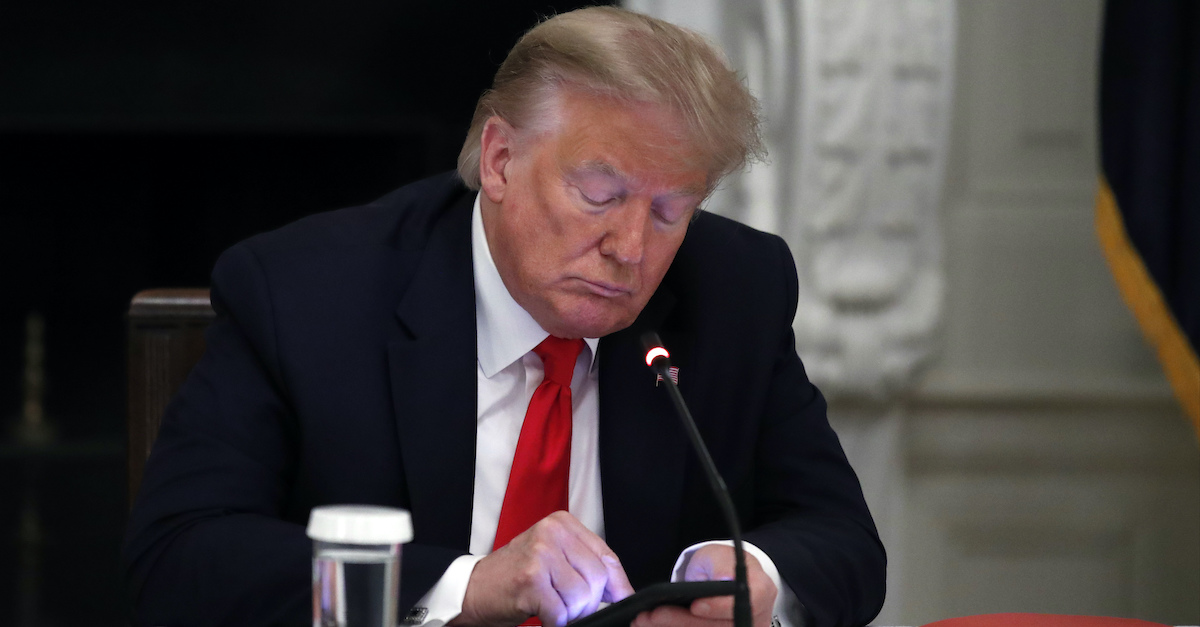
FILE – In this Thursday, June 18, 2020 file photo, President Donald Trump looks at his phone during a roundtable with governors on the reopening of America’s small businesses, in the State Dining Room of the White House in Washington. (AP Photo/Alex Brandon, File)
Former President Donald Trump cannot post sensitive discovery materials from his criminal hush-money case on “any news or social media platforms,” a Manhattan judge ruled on Monday.
The judge’s six-page protective order bars Trump from disseminating the “covered materials” on platforms “including, but not limited, to Truth Social, Facebook, Instagram, WhatsApp, Twitter, Snapchat, or YouTube, without prior approval from the court.”
Issued by Manhattan Supreme Court Justice Juan Merchan, the order establishes the rules governing how Trump can view evidence shared over the discovery process before his trial for allegedly falsifying business records.
Manhattan District Attorney Alvin Bragg claims that Trump committed felonies in how he allegedly coordinated a $130,000 payoff to pornographic film actress Stormy Daniels — and how he reimbursed his conduit, then-fixer Michael Cohen, to the tune of $420,000 for it. Cohen received his reimbursements in increments of $35,000, and prosecutors claim that Trump broke state law 34 times in these transactions.
Though his core theory of the case remains unclear, Bragg has alleged that Trump may have violated state and federal election law in these transactions and “mischaracterized, for tax purposes,” the nature of the payment.
Merchan’s order designates several categories of information as sensitive.
For example, Trump cannot disclose the names and identifying information of “New York County District Attorney’s Office personnel, other than sworn members of law enforcement, assistant district attorneys, and expert or fact witnesses (other than summary witnesses)” until jury selection. Bragg’s office can redact those names and identifying information from the discovery materials, the judge added.
When Trump’s indictment became imminent, the former president attacked Bragg on his platform Truth Social, and threats poured into the DA’s office. One included an envelope stuffed with white powder and a death threat: “Alvin — I’ll kill you.”
The former president is allowed to review portions of forensic images of witness cellphones containing five categories of information. Those include materials related to events discussed in the indictment, information about prior crimes of a witness, communications about any person identified on the government’s witness list, and notes with any prosecutor or law enforcement officer, state or federal.
Trump can also review information about himself on those cellphones.
The former president habitually lashes out about his civil and criminal liabilities on social media — and has gotten in trouble before for allegedly flouting court orders to restrain him from posting through his legal peril.
Before E. Jean Carroll took the stand in his ongoing civil rape trial, Trump wrote a post on Truth Social attacking his accuser and discussing two topics barred from trial — Carroll’s litigation financing and her legal team. That social media post earned Trump a stern rebuke from Senior U.S. District Judge Lewis Kaplan, who said such posts could “conceivably” put him “in harm’s way.”
“If I were in your shoes, I’d be having a conversation with your client,” Kaplan told attorney Joe Tacopina, who is representing Trump in both his civil and criminal cases.
Trump has not posted on Truth Social about Carroll since that time. His civil case remains ongoing.
Read the protective order here.
Have a tip we should know? [email protected]